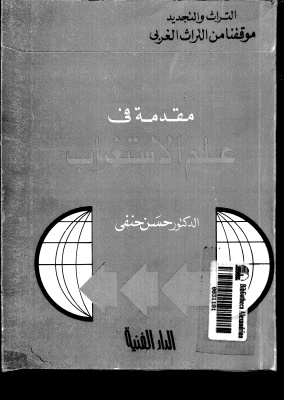Al-Qahira: Ad-Dar ul-Faniyat, 1990. — 884 p. (in Arabic)
Hassan Hanafi (b. 1935) is a contemporary Egyptian philosopher.
Hanafi is a disciple of the phenomenologist Osman Amin, and published a trilogy in which he used Husserl's methods to reconstruct classic Islamic philosophy and to critique the sources and development of European consciousness. Hanafi's interpretation of Islam has also been described as socialist and he has elaborated on the concept of an "Islamic Left", interpreting Islam in a socialist manner. He also promotes an interpretation of Islam supporting the development of a global ethics.
In his more recent works Hanafi has argued that Islam needs to be understood in way that facilitates human freedom and progress. Fahris ul-Mawzu'at:
Maza ya'ni 'ilm "ul-Istighrab"?
Takveen ul-Va'i ul-Adabi (al-Musadir).
Takveen ul-Va'i ul-Orubi (al-Bidayat).
Takveen ul-Va'i ul-Orubi (az-Zirvat).
Takveen ul-Va'i ul-Orubi (Nihayat ul-Bidayat).
Takveen ul-Va'i ul-Orubi (Bidayat ul-Nihayat).
Beniyat ul-Va'i ul-Orubi.
Masir ul-Va'i ul-Orubi.
Hanafi is a disciple of the phenomenologist Osman Amin, and published a trilogy in which he used Husserl's methods to reconstruct classic Islamic philosophy and to critique the sources and development of European consciousness. Hanafi's interpretation of Islam has also been described as socialist and he has elaborated on the concept of an "Islamic Left", interpreting Islam in a socialist manner. He also promotes an interpretation of Islam supporting the development of a global ethics.
In his more recent works Hanafi has argued that Islam needs to be understood in way that facilitates human freedom and progress. Fahris ul-Mawzu'at:
Maza ya'ni 'ilm "ul-Istighrab"?
Takveen ul-Va'i ul-Adabi (al-Musadir).
Takveen ul-Va'i ul-Orubi (al-Bidayat).
Takveen ul-Va'i ul-Orubi (az-Zirvat).
Takveen ul-Va'i ul-Orubi (Nihayat ul-Bidayat).
Takveen ul-Va'i ul-Orubi (Bidayat ul-Nihayat).
Beniyat ul-Va'i ul-Orubi.
Masir ul-Va'i ul-Orubi.

